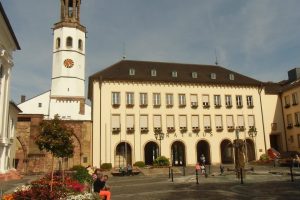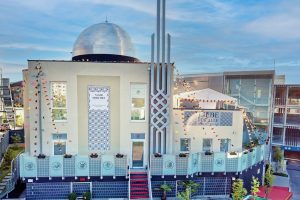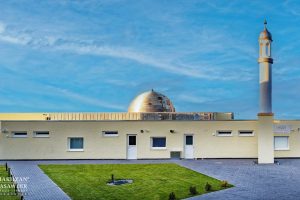
Sarmad Naveed, Canada
Islam is the fastest growing religion in the world, which means that people are seeing mosques built in their communities more than ever before.
There’s a good chance that the new mosque in your community belongs to the Ahmadiyya Muslim Community, the fastest growing sect in Islam unified under a single leader (known as the Ahmadiyya Caliph). Just recently, the Fifth Caliph and Worldwide Head of the Ahmadiyya Muslim Community, His Holiness, Hazrat Mirza Masroor Ahmad (aba) inaugurated a brand-new, beautifully constructed mosque in Dallas, Texas.

This is just one of the many mosques around the world which the Ahmadiyya Muslim Community has built; something it strives to do in the over 200 countries where it has been established.

But what’s so important about mosques and how could they impact your community?
The term mosque in Arabic is مسجد (masjid) which means a place where one prostrates or offers their prayers.
The foremost purpose of a mosque is to facilitate a place where Muslims can congregate to offer the five daily prayers which are principally meant to be offered in congregation.
Interestingly, although mosques are primarily Muslim places of worship, a mosque’s space is not limited to Muslims alone.
Hazrat Mirza Bashiruddin Mahmud Ahmad (ra), the Second Caliph of the Ahmadiyya Muslims Community explains:
‘Allah the Almighty states that no one has the right to stop another from the remembrance of God. If a person wishes to go to the mosque for the remembrance of God, or wishes to worship Allah the Almighty in their own way, then it is completely impermissible to stop them. If a Hindu, Sikh or Christian comes to a Muslim mosque and seeks to remember God in their own way, no Muslim has the right to stop them.’ [1]

A mosque in any community is literally meant to be a masjid, a place where one comes to offer prayer and worship God. The perfect example was set by the Holy Prophet (sa), who allowed the Christians of Najran to pray in his mosque, showing all Muslims that a mosque’s doors should always be open to the community.
It’s with this very spirit that the Ahmadiyya Muslim Community, under the leadership of its divinely established Caliphate, builds mosques all around the world.
Hence, not only is a mosque meant to be a place to worship God: it’s a place to serve the community. At the inaugural reception of the new mosque in Dallas, His Holiness, Hazrat Mirza Masroor Ahmad (aba) explained:

‘The principle objectives underlying any mosque built by our Community are always the same. Firstly, our mosques serve as a place for our members to congregate to fulfill their religious duties of worshiping God Almighty. Secondly, our mosques enable us to serve God’s creation and to propagate Islam’s teachings.’
One may wonder, with all that’s portrayed in the media about Islam and Muslims, could mosques and Muslim congregations really be a good thing for the community?
In the historic address at Texas, His Holiness (aba) cut through the myths projected by much of the media in recent years:
‘…a sincere Muslim who understands and values Islam’s teachings can never act in a way that defames or misrepresents Islam and can never be a cause of grief or distress for non-Muslims. Accordingly, let me very clearly state that this mosque will never cause you or your fellow citizens any harm or distress.’
This is rooted in the fact that if a Muslim truly desires to take benefit of a mosque and to worship God in the truest sense, they must not only serve God’s creation, but become proponents of peace and harmony within their own communities, as His Holiness (aba) further states:
‘Rather than sowing seeds of discord and disharmony in society, this mosque will serve as a unifying force for good. This mosque’s very purpose and objective is, and will always remain, God-willing, to be a source of everlasting peace and a means to foster love and mutual respect amongst the people of all faiths and beliefs. This is our commitment not just here, but wherever and whenever we build a mosque in any part of the world.’
So what kind of people can you expect to be frequenting the new mosque in your community? People who have been enjoined by God to do the following:

‘O ye who believe! When you stand up for Prayer, wash your faces, and your hands up to the elbows, and pass your wet hands over your heads and wash your feet to the ankles. And if you be unclean purify yourselves by bathing’ (5:7)
Without purifying themselves and performing ablution before every prayer, worshippers at a mosque cannot hope to establish inner purity through their prayers. Promoting physical purity as an integral part of spiritual purity only enhances the overall environment of the mosque and by extention, the community in which it is situated.
Similarly, God enjoins every person who goes to the mosque:
‘O children of Adam, look to your adornment at every time and place of worship (masjid)’ (7:32)
Wearing clean clothes, applying a pleasant fragrance and adorning the environs of a mosque are all parts of the basic etiquettes of a mosque. This is all meant to be a mirror image – outer purity reflects inner purity, and inner purity reflects on the environment. This in essence, is the core purpose of a mosque.

Hence, with its doors open to the wider community, a clean and comfortable environment and a focus on unity under God, a mosque in your community can truly be a foundational building block for peace and harmony in your neighborhood and beyond.
In the beautiful words of His Holiness (aba):‘I urge anyone who has any doubt or fears to breathe a sigh of relief in the knowledge that this new mosque built by the Ahmadiyya Muslim Community will only ever represent and reflect Islam’s enlightened teachings of peace respect and tolerance. Our teaching is not to confront those who have different beliefs to us, but to embrace them. Our teaching is not to attack our opponents but to defend them and their rights. Rest assured, this mosque will radiate nothing but love, compassion and sympathy for mankind.’
About the Author: Sarmad Naveed is an Imam of the Ahmadiyya Muslim Community who graduated from the Ahmadiyya Institute for Languages and Theology in Canada. He serves on the Editorial Board of The Review of Religions and coordinates the Facts from Fiction section. He has also appeared as a panelist and host of programmes on Muslim Television Ahmadiyya (MTA) such as ‘Ahmadiyyat: Roots to Branches.’
ENDNOTES
1. Tafsir-e-Kabir by Haxrat Mirza Bashiruddin Mahmud Ahmad (ra) Vol. 1 p. 131




Add Comment